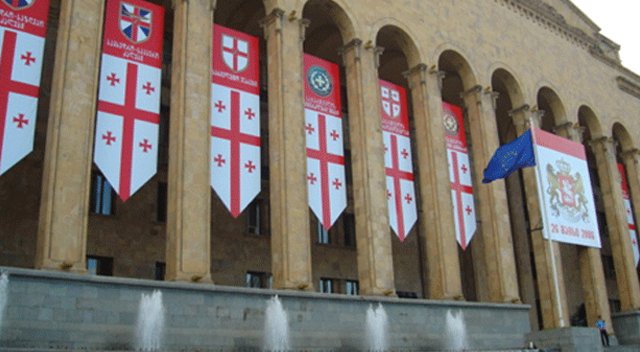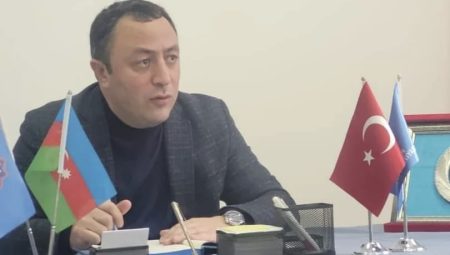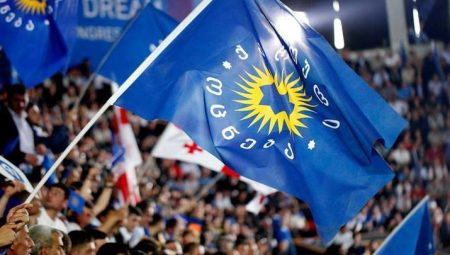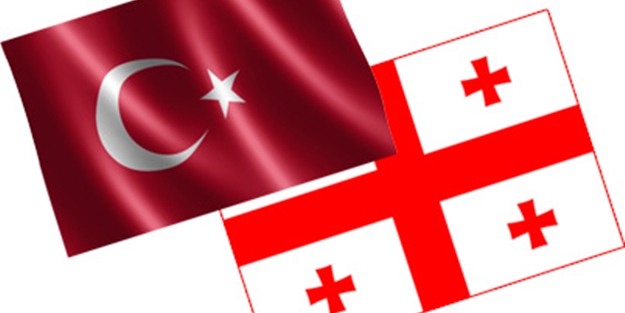“Georgia is losing its political subjectness”
The Georgian news agency Accent’s exclusive interview with Israeli political analyst, President of the Institute of Eastern Partnership, strategic adviser of Circassian Congress, Avraham Shmulevich.
-In 2015 you wrote in your post that Russia’s withdrawal from the Caucasus region was approaching. How realistic is this perspective now?
-Nothing is permanent in this world and there are no permanent empires, moreover, colonial empires. I would like to remind you that various Caucasian peoples lived in this area for many millennia, while Russia came to the Caucasus 200 years ago and there is no reason to assume that it came to the Caucasus to stay forever. In general, conquerors came and went all over the world. Russia is the last colonial empire and the century of colonial empires has passed. The large parts of colonial territories have already been separated from Russia; I mean the collapse of the Soviet Union and we do not have any reason to assume that this process will stop. Moreover, there is economic and political crisis in Russia now…We can see that the North Caucasus is increasingly mentally and economically distancing itself from Russia; North Caucasians no longer consider themselves as part of Russia and the largest part of the Russian Federation believes that the Caucasus – it’s something completely alien to them.
Ongoing destructive processes in the Caucasus and in general, in the Russian Federation in recent years are intensifying and it is natural. I think the days, when the Russian Empire in the Caucasus shares the fate of all the colonial empires in the world, are not far away. Moreover, European colonial empires were governed much better and were economically stronger than Russia; however, nowadays they no longer exist.
-I want to ask you about Chechnya and the role of Kadyrov. After several clashes between “Kadyrov’s men” and military servicemen of the Russian military base, there were emerged opinions that Kadyrov is a danger to Russia…
-I don’t think that Kadyrov will become a problem for Putin. On the contrary, I think that Kadyrov and Chechnya under his totalitarian governance is an example for Putin, who wants to see the same in the rest of the Russian Federation. Kadyrov is an absolute ruler of Chechnya, he has already established his totalitarian regime and Putin wants to turn whole Russia into what is today’s Chechnya.
As for the local clashes, modern Chechnya – this is a kind of return to feudalism, where always takes place some local rulers’ confrontations and as a result of which, the main ruler is not affected. In addition, any dictator would be happy to embrace the idea of “divide and conquer” in order to strengthen his/her governance. By the way, the same thing happens in Russia itself: there are the new feudal lords, Putin’s inner circle, who are fighting with each other, but this does not undermine his authority. The same thing takes place in Chechnya: there are law enforcers who hate Kadyrov and others who work for Kadyrov and, naturally, they fight against each other…This is the usual thing when it comes to the authoritarian ruler. So, I think, Kadyrov will maintain his post in the future. Of course, if some kind of the global changes take place in Moscow; for example, if the Kremlin administration is somewhat shaken or in case of military confrontation with the West, Kadyrov may initiate an independent game, as it happened in Turkmenistan after collapse of the Soviet Union, where was totalitarian governance of Niyazov, former first secretary of the Turkmen Communist Party. Another example is Afghanistan, where the Communists still governed the country during several years, after collapse of the Soviet Union. Kadyrov is not a Chechen ruler so far, as he is appointed by Moscow to govern Chechnya’s colony and Putin still trust him.
-You often criticize, including under Georgia’s former President Mikheil Saakashvili’s regime, Georgia’s policy towards the Caucasus. Has anything changed in this regard under the current government of Georgia, if so, what has changed? In your opinion what can and should Georgia offer its Caucasian neighbours and why it is important for Georgia?
– The situation has only worsened in this regard. Moreover, nowadays Georgia doesn’t have any policy towards the Caucasus. There were strong cultural, scientific ties between Georgia and the North Caucasus; there were several large foundations – including the foundation “Caucasus”, exchange of journalists and other programs… All of these projects have been closed; all of these ties have been broken. Under Saakashvili’s regime there was some kind of policy towards North Caucasian peoples, but now there is nothing like this.
This is a catastrophe for Georgia, because Georgia is not situated on the moon, it is situated in the Caucasus region, representatives of the North Caucasus live in Georgia and Georgians live in the North Caucasus republics, there were links between the two peoples for thousands of years .. Any normal government, regardless of its political orientation, is obliged to maintain contacts with its neighboring nations, but there is no any clear policy in Georgia in this regard, so, the situation has been worsened.
-In your opinion, what is the reason of this?
-I think that the reason is that now Georgia is largely in the Russian policy format. It is known that Moscow was very irritated by Georgia’s policy toward the North Caucasus under Saakashvili’s regime. In general, I have the impression that Moscow’s first demand was the new government of Georgia to stop all its initiatives. Nowadays we can see that there is quite difficult situation in Georgia regarding the country’s foreign policy initiatives; the drive existing under the governance of the United National Movement has disappeared; there is no longer exist Georgia’s clear image in the world (one can agree or disagree on this), which existed under Saakashvili’s regime. Now there is the impression of the general swamp.
-And the reason is the same?
-In general, yes, Georgia is losing its political subjectness. In this regard, Georgia’s policy towards the North Caucasus is in line with the general policy of Georgia.
-A short time ago there took place an unpleasant incident: one of the members of the delegation of the North Caucasian lawmakers had been allowed by Georgian border guards to enter the country, but later he was ordered to leave the country. After this incident the whole delegation left Georgia. This visit should have taken place at the initiative of the North Caucasian side. The meetings should have been held in Georgia’s Parliament. It seems that after this incident, such initiatives will not be voiced by the North Caucasian side in the near future…
-This delegation included several Chechen lawnmakers, including those who have close ties with Kadyrov; the delegation also included representatives of Chechen non-governmental organizations. This certainly is not the first time when Georgian border guards don’t allow residents of the North Caucasus to enter Georgia. And in many cases we are talking about ordinary citizens and unfamiliar personalities. Georgian side’s logic in this regard, to be honest, is vague to me. It seems the Georgian government considers this region as suspicious- that they are Islamists, etc.
In addition, the reason of the above-mentioned incident may be related to the fact that some hosts of this delegation had close ties with the United National Movement. However, there is no any clear policy and it is unclear why Georgia allows one North Caucasian to enter the country and bans another from entering the country. In general, when a state makes a decision, this state must explain the reason and principle of its decision, even this principle is unacceptable for anyone. I can also assume that Georgia does not want to deal with Kadyrov’s quite odious regime, because the Chechen battalions fought against Georgia in the past, but if so, this should also have been explained. Any normal country explained its principles towards Russia, Chechnya, and Kadyrov; since there was no any explanation and no one mentioned the principle, so we can only guess. I have the impression Georgia has no any principles towards the North Caucasus.
-I want to ask you about Karabakh; in your opinion, what was the reason of the escalation of the situation in April. How would you assess the current situation and the future prospects for Karabakh? In your opinion, what kind of role can Georgia play for the conflicting sides?
-I think the Karabakh conflict is related to Russia’s foreign policy. In general, all the conflicts, including the Abkhazian and South Ossetian conflicts, in the post-Soviet space were created by the security forces of the Soviet Union, as a deterrent factor of the collapse of the empire. And now Russia, just like the entire post-Soviet years, actively uses the unresolved Karabakh conflict in order to strengthen its position in the region. This is some kind of hook for Armenia and Azerbaijan. Russia’s goals were quite clearly defined: Moscow wants to deploy so-called peacekeepers in the conflict zone; it wants to take not only political and economic control, but also military control over this area. Russia used this unresolved conflict to achieve this goal. Russia had supplied Armenia’s with modern weapons cost of 200 million, which seriously changed the situation, and then sent the signal to Azerbaijan that in case of resumed intense military hostilities it would not interfere in it. And the intense military hostilities have been resumed. Now some kind of bargaining is underway: Russia voiced its plan about deployment of so called Russian peacekeepers in the conflict zone; Baku was promised that Russia will exert pressure on Armenia in order to free some part of the occupied territories…The West and the United States were also involved in this issue. Armenian President Serzh Sargsyan and Azerbaijan’s President Ilham Aliyev arrived in Washington, where some agreements were reached. Shortly, we can see that Russia actively and very successfully plays this card and it will not refuse to do this in any way.
Thus, I think, there will be several facts of escalation in the near future, if the government of Azerbaijan, for example, refuses to Moscow’s proposals. According to Ukrainian and Azerbaijani media, militants from Donbass may be deployed in Azerbaijan. This is clearly a signal to Baku: “if you are too unyielding, we will strengthen Armenia to return back some part of the territories lost during this confrontation”.
-Georgia has offered its territory to the conflicting sides for conducting negotiations…
-Theoretically, of course, Georgia could play a major constructive role in resolving this conflict and thus increase its importance in the international arena. There are Armenian Diaspora and Azerbaijani Diaspora in Georgia; Georgia has good relations with both countries; Tbilisi has no other interest other than establishing peace between these countries and the region. But here again is the question: how Georgia will carry out any kind of independent policy? It seems that Russia allows the Georgian government to play some independent games, but Tbilisi will fulfill Moscow’s instructions regarding all the principle issues. The entire foreign policy of Georgia is a sham – there is such an opinion and I think it is quite reasonable. In other words, Georgia could play constructive role, if in general, the country has the opportunity to play an independent role contrary to the interests of Moscow. It seems doubtful to me. If Moscow wants to do something, it’s difficult to imagine that the Georgian government will act against it.
-Is this related to the position of the current Georgian Government or other realities? For example, Georgia is not strong enough to resist Moscow regarding some issues…
-There is no concept of a weak country. For example, there is almost same number of population in Finland, but it is one of the leading countries in the world politics. Even Abkhazia, in spite of everything, resists quite effectively Moscow regarding many principle issues…
-Do you think that there is no enough desire in Tbilisi to resist Moscow?
– As Mikhail Leontiev said after the election in 2012, Russian oligarch Boris Grigorevich Ivanishvili came into power in Georgia…
-By the way, when he came into power, he said that Georgia needs to realize its small role in the international arena; it should stop playing international games and pay attention to resolving its own problems, including economic problems… Unfortunately, the country still has many economic problems; as for the international arena, as many analysts have pointed out Georgia is gradually losing its small role in the international arena. Given the above-mentioned skepticism regarding Georgia’s European and Euro-Atlantic integration are often voiced in the country…Some perceive this as symptoms of what you said above and as an attempt by the ruling elite to accustom the Georgian population to such opinions…
-Ivanishvili, as the person, who has a considerable amount of money through the international relations, should perfectly aware that the international politics and economy are closely linked to each other. He should aware that the country, which is unable to defend its foreign policy interests, will not be able to defend them in the field of trade, economy, etc. In principle, any student of the first course of the Faculty of Economics knows this and especially Ivanishvili should know this. So, I think it’s a deliberate policy. Minimizing the pace of Georgia’s European and Euro-Atlantic course is clear. Any country, especially in the region, where several big actors express their interests, must act to defend its own interests. If Georgia refuses to carry out its own foreign policy, of course, it will be subject to one of these actors, in this case this will be Russia.
-And the final question, I want to ask you about occupied territories. On May 19, Giga Otkhozoria, who was a resident of the village of Bargebi, the Gali district, was allegedly shot dead by the so-called Abkhazian border guard on the Georgian-controlled territory close to the Nabakevi Crossing Point on the Administrative Boundary Line between occupied Abkhazia and rest of Georgia. Georgian government officials assessed this incident as action against Georgia’s reconciliation policy. When asked why Georgian law enforcement officers did not detain the perpetrator, in a private conversation Georgian law enforcement officers told us that in this case the situation could be even more escalated. In your opinion, what could have been done in this situation? And what can be done in such situations?
-I do not know what Georgians will do, but if I were Abkhazians, I will arrange trips in Tbilisi to shot dead Georgian citizens. Escalating of the situation is possible at any time and any place. For example, 100km far away from the Administrative Boundary Line; thus, this situation and the statements do not match the perception, moreover, in the Caucasus! You cannot accept the impunity of murderer due to the reason “not to escalate the situation”. What can be even worse happen when a person is killed in your territory?! Any state and people should have basic self-esteem! When Russians started the process of the so-called borderization near the South Ossetian Administrative Boundary Line and this included the strategically important area, Georgia did not respond to this. A new step has been taken in the same direction… If it goes on, wait for the hunting tours of Abkhazians for Georgian citizens…I do not know, maybe someone will call this reconciliation policy, but to say lightly, it looks strange to me.






